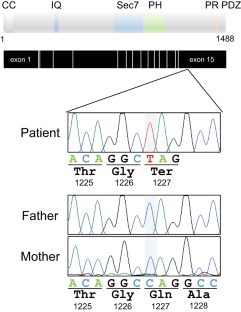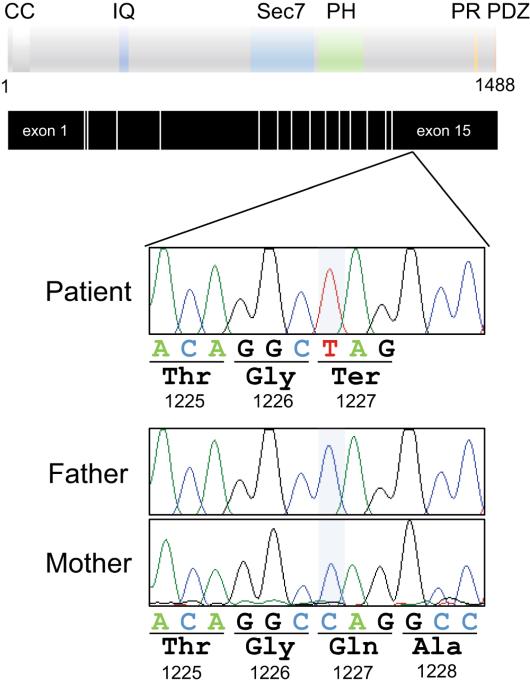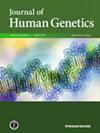IQSEC2 的 C 端截断:对突触定位、鸟嘌呤核苷酸交换因子活性和神经系统表现的影响
IF 2.6
3区 生物学
Q2 GENETICS & HEREDITY
引用次数: 0
摘要
染色体 Xq11.22 上的 IQSEC2 基因编码鸟嘌呤核苷酸交换因子(GEF)蛋白的一个成员,该蛋白参与激活突触后密度(PSD)上的 ADP 核糖基化因子(Arfs),并在突触传递和树突棘形成中发挥关键作用。IQSEC2 的改变与 X 连锁智力发育障碍有关,包括癫痫和行为异常。值得关注的是,IQSEC2 C端的截短变异可导致严重的表型,这与位于其他区域的截短变异类似。在此,我们介绍了一名患有严重智力障碍和进行性癫痫的 5 岁男孩。他携带的 IQSEC2 基因最后一个外显子中的无义变异 p.Q1227*,本应逃脱无义介导的 mRNA 衰减,从而导致具有残余活性的 C 端截短 IQSEC2 蛋白的翻译。功能分析显示,IQSEC2 Q1227* 的 GEF 活性受到了影响,而且由于缺乏与 PSD 中的支架蛋白结合的功能域,IQSEC2 Q1227* 缺乏优先突触定位。突变体IQSEC2蛋白的GEF活性受损和突触定位紊乱可能会影响神经元的树突和脊柱发育,从而可能解释患者严重的神经系统表现。我们的研究结果表明,IQSEC2 的 C 端截短(以前没有被很好地描述)可能具有重要的致病意义。本文章由计算机程序翻译,如有差异,请以英文原文为准。


C-terminal truncations in IQSEC2: implications for synaptic localization, guanine nucleotide exchange factor activity, and neurological manifestations
IQSEC2 gene on chromosome Xq11.22 encodes a member of guanine nucleotide exchange factor (GEF) protein that is implicated in the activation of ADP-ribosylation factors (Arfs) at the postsynaptic density (PSD), and plays a crucial role in synaptic transmission and dendritic spine formation. Alterations in IQSEC2 have been linked to X-linked intellectual developmental disorders including epilepsy and behavioral abnormalities. Of interest, truncating variants at the C-terminus of IQSEC2 can cause severe phenotypes, akin to truncating variants located in other regions. Here, we present a 5-year-old boy with severe intellectual disability and progressive epilepsy. The individual carried a nonsense variant p.Q1227* in the last exon of the IQSEC2 gene that was supposed to escape nonsense-mediated mRNA decay, thereby leading to a translation of C-terminus truncated IQSEC2 protein with residual activity. The functional analyses showed that the GEF activity of IQSEC2 Q1227* was compromised, and that the IQSEC2 Q1227* lacked preferential synaptic localization due to the absence of functional domains for binding to scaffolding proteins in the PSD. The impaired GEF activity and disrupted synaptic localization of the mutant IQSEC2 protein could impact dendritic and spine development in neurons, potentially explaining the patient’s severe neurological manifestations. Our findings indicate that C-terminal truncations in IQSEC2, previously not well-characterized, may have significant pathogenic implications.
求助全文
通过发布文献求助,成功后即可免费获取论文全文。
去求助
来源期刊

Journal of Human Genetics
生物-遗传学
CiteScore
7.20
自引率
0.00%
发文量
101
审稿时长
4-8 weeks
期刊介绍:
The Journal of Human Genetics is an international journal publishing articles on human genetics, including medical genetics and human genome analysis. It covers all aspects of human genetics, including molecular genetics, clinical genetics, behavioral genetics, immunogenetics, pharmacogenomics, population genetics, functional genomics, epigenetics, genetic counseling and gene therapy.
Articles on the following areas are especially welcome: genetic factors of monogenic and complex disorders, genome-wide association studies, genetic epidemiology, cancer genetics, personal genomics, genotype-phenotype relationships and genome diversity.
 求助内容:
求助内容: 应助结果提醒方式:
应助结果提醒方式:


